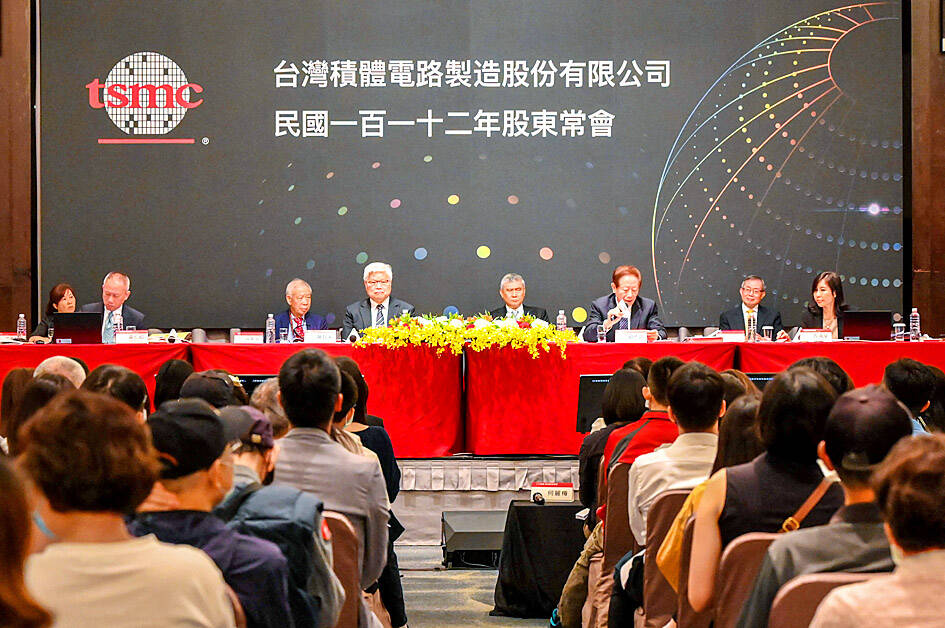Taiwan Semiconductor Manufacturing Co (TSMC, 台積電) yesterday said that the majority of its most advanced chips would continue to be manufactured in Taiwan and that it is boosting advanced chip packaging capacity to catch up with fast-growing demand driven by generative artificial intelligence (AI) applications like ChatGPT.
Deeply rooted in Taiwan, TSMC is expanding production capacity for its most advanced 3-nanometer (nm) chips at its Tainan fab and is building new plants to produce new 2-nanometer chips in Hsinchu and Taichung in 2025.
The chipmaker also plans to produce next-generation, cutting-edge 1.4-nanometer chips, which are currently under development, at home, it said.

Photo: Sam Yeh, AFP
“A majority of [these advanced chips] will be made in Taiwan,” TSMC chief executive C.C. Wei (魏哲家) said in response to a shareholder’s question about capacity expansion plans during the company’s annual general meeting in Hsinchu.
"I think Taiwan’s semiconductor industry plays a stabilising role amid global geopolitical tensions. Whether it’s China or the United States... they all hope that TSMC is around," said TSMC chairman Mark Liu (劉德音).
"I hope Taiwan’s semiconductor industry can do well to have a stabilising effect on global geopolitical conflict."
Although TSMC has been expanding its global footprint in the past few years to meet customers’ requirements, it expects that only a small portion, or about 20 percent, of its 28-nanometer chips and some advanced chips would be made at fabs outside Taiwan in the next five years or even longer.
Aside from its advanced fabs in the US, TSMC deploys more mature process technologies to produce chips mostly for vehicles and other gadgets at its fabs in China and Japan.
The company is also evaluating plans to build two new fabs — in Japan and in Europe, likely in Germany — to produce less advanced chips.
TSMC is engaging with customers and partners to evaluate the feasibility of building a specialty fab focused on automotive technology in Germany, it said.
Like its Japanese fab, the company is considering allowing some automotive customers to hold minor stakes in the planned fab, Liu told a media briefing after the shareholders’ meeting.
At home, TSMC is trying hard to boost advanced packaging capacity through unconventional approaches to cope with demand after ChatGPT and other generative AI applications became popular at the start of the year.
“Because of ChatGPT, TSMC has received large orders for advanced packaging. Demand has greatly exceeded our capacity,” Liu said.
Nvidia Corp, a major supplier of AI graphics processing units, is one of the major clients of TSMC’s chip-on-wafer-on-substrate (CoWoS) packaging technology.
To satisfy customers’ demand, TSMC allocated some capacity for the advanced packaging technology at its fab in Taoyuan’s Longtan District (龍潭), Liu said, adding that it outsources some of the CoWoS production to chip packagers.
For the full year, CoWoS capacity would be double the size of last year, as the company continues its pace of expansion, he said.
Revenue contribution from chips used in generative AI applications is still tiny, but this new business is helping the company’s advanced chip packaging reach economies of scale, Liu said.
TSMC also called on the government to step up efforts to encourage green energy production.
Because of the scarcity of energy from renewable sources in Taiwan, the company would not be able to achieve carbon neutrality by 2030, Liu said.
Additional Reporting By AFP

The Ministry of the Interior (MOI) is to tighten rules for candidates running for public office, requiring them to declare that they do not hold a Chinese household registration or passport, and that they possess no other foreign citizenship. The requirement was set out in a draft amendment to the Enforcement Rules of the Public Officials Election and Recall Act (公職人員選舉罷免法 ) released by the ministry on Thursday. Under the proposal, candidates would need to make the declaration when submitting their registration forms, which would be published in the official election bulletin. The move follows the removal of several elected officials who were

The Republic of China (ROC) is celebrating its 114th Double Ten National Day today, featuring military parades and a variety of performances and speeches in front of the Presidential Office in Taipei. The Taiwan Taiko Association opened the celebrations with a 100-drummer performance, including young percussionists. As per tradition, an air force Mirage 2000 fighter jet flew over the Presidential Office as a part of the performance. The Honor Guards of the ROC and its marching band also heralded in a military parade. Students from Taichung's Shin Min High School then followed with a colorful performance using floral imagery to represent Taiwan's alternate name

FOUR DESIGNATED AREAS: Notices were issued for live-fire exercises in waters south and northwest of Penghu, northeast of Keelung and west of Kaohsiung, they said The military is planning three major annual exercises across the army, navy and air force this month, with the navy’s “Hai Chiang” (海強, “Sea Strong”) drills running from today through Thursday, the Ministry of National Defense said yesterday. The Hai Chiang exercise, which is to take place in waters surrounding Taiwan, would feature P-3C Orion maritime patrol aircraft and S-70C anti-submarine helicopters, the ministry said, adding that the drills aim to bolster the nation’s offshore defensive capabilities. China has intensified military and psychological pressure against Taiwan, repeatedly sending warplanes and vessels into areas near the nation’s air defense identification zone and across

A Chinese takeover of Taiwan would severely threaten the national security of the US, Japan, the Philippines and other nations, while global economic losses could reach US$10 trillion, National Security Council Deputy Secretary-General Lin Fei-fan (林飛帆) wrote in an article published yesterday in Foreign Affairs. “The future of Taiwan is not merely a regional concern; it is a test of whether the international order can withstand the pressure of authoritarian expansionism,” Lin wrote in the article titled “Taiwan’s Plan for Peace Through Strength — How Investments in Resilience Can Deter Beijing.” Chinese President Xi Jinping’s (習近平) intent to take Taiwan by force